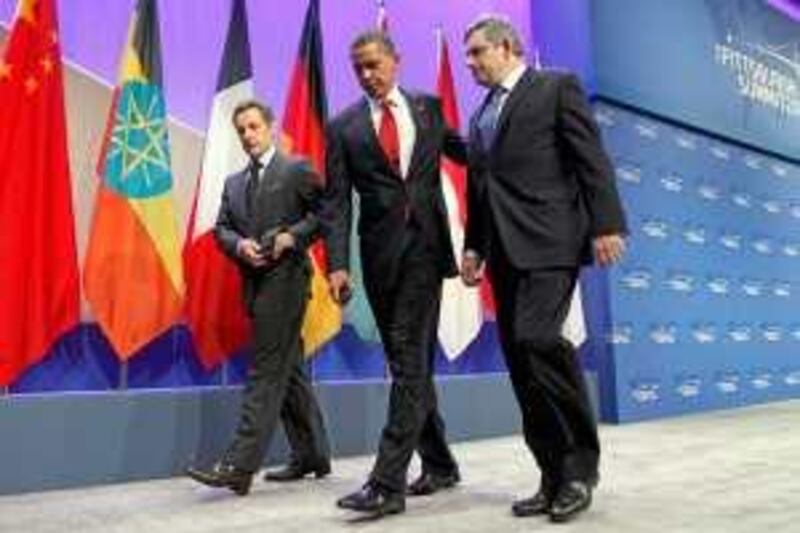PITTSBURGH // The Group of 20 (G20) developed and emerging economies, fresh from a triumphant show of unity at Pittsburgh, faces months of deal making and communication to markets that will test its credibility as the premier global forum for economic co-operation. "It worked," G20 leaders declared over the weekend of their response to the global financial crisis.
"Our forceful response helped stop the dangerous, sharp decline in global activity and stabilise financial markets," they said in the final summit communique. The leaders agreed their summits would supplant those of the Group of Seven (G7) rich nations as the high table of global policy making, promising to give rising powers such as China more say in rebuilding and guiding the world economy. While G7 states were right to accept the inevitable dilution of global economic power caused by the rapid industrialisation of poorer countries, analysts said the size and diversity of the group would probably complicate policy co-ordination.
"There are a lot of cooks in the kitchen ? I would wait until we declare victory," said Simon Johnson, a former chief economist of the IMF. "They have to prove their value and legitimacy." Significant among G20's resolution was the promise of a united front on bank pay and bonuses, and an endeavour to "raise standards together". Banks were told to avoid "multi-year guaranteed bonuses" and a "significant portion of variable compensation" must be deferred, paid in stock, tied to performance and subjected to clawbacks if earnings drop.
The measure was aimed at making sure bankers do not get huge payouts for making risky bets that later go bad. The G20 stopped short of endorsing a French proposal to introduce specific caps on pay. "There is no going back to systems of bonuses that were based simply on short-term speculation and not on the long-term success of companies," said Gordon Brown, the British prime minister. But challenges to the group's new mantle lie everywhere, from inertia on climate change to scepticism in global financial markets.
G20 nations will remain in the spotlight at the IMF meetings in Istanbul next month, another summit in South Korea in November and the UN climate change talks in December. Markets were unlikely to react to the support in Pittsburgh for a US-led push to reshape the global economy by smoothing out huge surpluses in exporting powerhouses such as China and large deficits in big importers such as America.
"Any indication of unity will move the dollar," said Christopher Low, the chief economist at FTN Financial in New York. "But disagreement will rule and that should result in no market reaction." G20 leaders agreed to work together to assess how domestic policies mesh and to evaluate whether they were "collectively consistent with more sustainable and balanced growth". Countries with sustained, significant surpluses - a description that fits China - pledged to strengthen domestic sources of growth, according to the communique. By the same token, countries with big deficits, such as the US, pledged to support private savings.
The leaders agreed to shift some voting rights at the IMF to under-represented countries such as China from rich ones, another sign of the changing balance of economic power accelerated by the financial crisis. The leaders pledged to keep emergency economic support in place until sustainable recovery was assured, an increasingly sensitive issue for global financial markets. On Friday, the MSCI world equity index hit a 10-day low, with some investors saying they were preparing for an eventual rise in borrowing costs.
"There's real uncertainty coming into the policy setting. And this is making it harder work for the rally to be sustained," said Michael Dicks, the head of research and investment strategy at Barclays Wealth. The next G20 meeting in November takes place in South Korea, where the central bank is poised to become the first in the group to raise interest rates since the collapse of Lehman Brothers a year ago threatened to rupture the global financial system.
Despite the show of solidarity, there were some sources of friction. Many Europeans were frustrated that little was agreed on how to pay for fighting climate change, particularly with a December climate summit in Copenhagen fast approaching. "I do not hide my concern at the slow rate of progress. It's time to get serious now, not later," said Jose Manuel Barroso, the European commission president.
* with Reuters and Bloomberg





